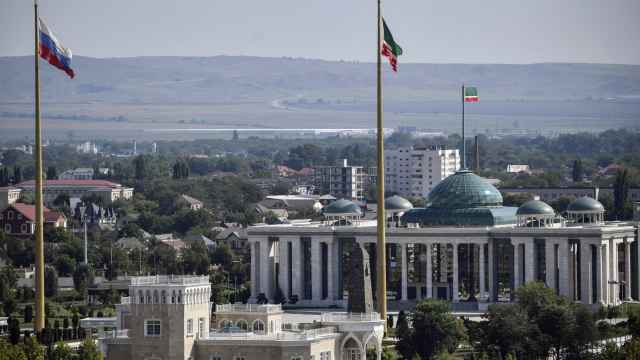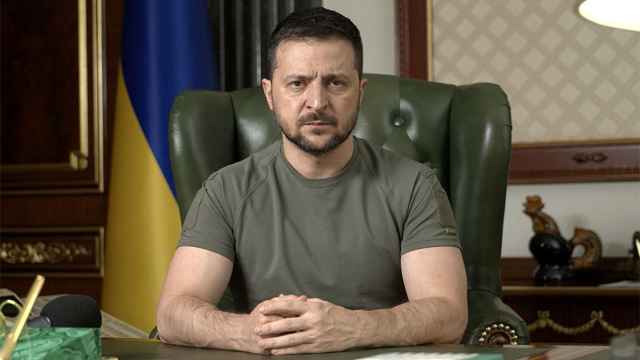The shock wave from the explosion of the meteorite on Feb. 15 was felt not only in Chelyabinsk but also throughout the Russian media. The RIA-Novosti website nearly crashed from the flood of visitors eager to study its rich illustrations depicting details of the event. Novaya Gazeta suggested that the meteorite was a diversionary tactic of the ruling regime. Television talk shows were filled with discussions suggesting that although the end of the world hadn't come as expected in December, the Earth would soon be destroyed by a meteorite.
On Thursday, another informational bombshell hit, sending shock waves among the more attentive members of the public who happened to notice it. Russian media outlets cited a Reuters report stating that presidential economic adviser Sergei Glazyev is the most likely candidate to replace current Central Bank Chairman Sergei Ignatyev when his term expires in June. The president has until the end of March to announce his decision.
Glazyev, who served as foreign economic affairs minister under Prime Minister Yegor Gaidar, is one of the few truly successful and democratic figures who served in that government. Unlike most of his colleagues, he was never a fan of Chilean dictator Augusto Pinochet. This motivated him to resign in the autumn of 1993 to protest both President Boris Yeltsin's decision to fire on the parliament building, whose inhabitants did not like the economic policies of young reformers. Glazyev is one of the architects of the customs union and the common economic space linking Russia with Europe.
The Russian edition of Forbes reacted to the Reuters report by writing: "The man who once said that the U.S. and Europe conducted money emissions to seize Russian assets might head the Central Bank." The magazine then quoted an unidentified economist as predicting that the Moscow Exchange would fall by 1,000 points in 12 months as a result. The liberal Gazeta.ru interpreted the news in the same spirit with the headline: "Central Bank Surrounded by Enemies."
The reason for the panic is a memo from Glazyev to President Vladimir Putin that Vedomosti reported in January. It reads, in part: "Foreign capital threatens to absorb Russian assets as a result of increasing emissions of world currencies." It would seem to be a statement of fact. Enormous quantities of dollars and euros printed without any financial basis really could be used to purchase substantial assets.
However, the media preferred the interpretation of Anatoly Chubais, the godfather of the 1990s privatization. He said, "Anyone might seriously believe that money emissions in the U.S. and Europe are made in order to seize Russian assets on the cheap — anyone, that is, but an economist."
A day after the report of Glasyev's possible appointment leaked out, Kremlin spokesman Dmitry Peskov declined to confirm the information.
Odnako magazine editor-in-chief and close Kremlin associate Mikhail Leontyev interpreted the situation by saying that although Glazyev might not be a candidate to head the Central Bank, the leak sent a signal to the liberals who have been managing the Russian economy for the past 20 years that their monopoly might come to an end.
So while enterprising residents of Chelyabinsk long ago replaced their broken windows and began selling all manner of meteorite shards on the Internet, the panic in Moscow is just beginning.
Alexei Pankin is the editor of WAN-IFRA-GIPP, a magazine for publishing business professionals.
Related articles:
A Message from The Moscow Times:
Dear readers,
We are facing unprecedented challenges. Russia's Prosecutor General's Office has designated The Moscow Times as an "undesirable" organization, criminalizing our work and putting our staff at risk of prosecution. This follows our earlier unjust labeling as a "foreign agent."
These actions are direct attempts to silence independent journalism in Russia. The authorities claim our work "discredits the decisions of the Russian leadership." We see things differently: we strive to provide accurate, unbiased reporting on Russia.
We, the journalists of The Moscow Times, refuse to be silenced. But to continue our work, we need your help.
Your support, no matter how small, makes a world of difference. If you can, please support us monthly starting from just $2. It's quick to set up, and every contribution makes a significant impact.
By supporting The Moscow Times, you're defending open, independent journalism in the face of repression. Thank you for standing with us.
Remind me later.





